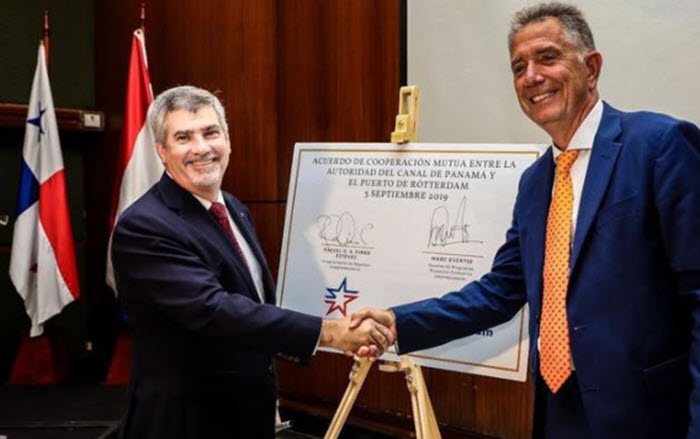The Panama Canal and the Port of Rotterdam signed a Memorandum of Understanding to promote international trade between Europe and the West Coast of South America
The Panama Canal and the Port of Rotterdam signed a Memorandum of Understanding (MOU) to promote international trade between Europe and the West Coast of South America. Through this agreement, the two organizations will work closely to optimize operations while encouraging economic growth and the exchange of information on new business development opportunities, including logistics parks and port development projects.
“The Expanded Canal continues to reshape global trade routes today, reinforcing our position as the logistics hub of the Americas,” said Vice President for Complementary Businesses Rafael Pirro. “We are proud to be partnering with the Port of Rotterdam to ensure our customers experience the most efficient, consistent service and develop new business opportunities.”
The agreement, comes at a period of continued growth for both the Panama Canal and Port of Rotterdam. Last month, the Port celebrated a new transshipment record for the first six months of 2019 with 240.7 million tons handled, marking a 3.4% increase compared to 2018. During the same month, the Canal set a new daily tonnage record of 1.706 million Panama Canal tons (PC/UMS) on August 16, not long before welcoming the 7,000th Neopanamax transit since the inauguration of the Expanded Canal in 2016.
The MOU is renewable after two years and will allow for both parties to share information on their technological capabilities, including the implementation of digital tools and applications aimed at improving transport efficiency and cost reduction. Also, the MOU includes the exchange of market studies, transit data and modernizations plans, as well as joint training programs, studies and marketing activities between the two parties.
In addition to their roles as regional logistics hubs, the Port of Rotterdam and the Panama Canal share a commitment to sustainable shipping. They have already collaborated closely through their work as members of the Global Industry Alliance (GIA), a public-private partnership initiative of the International Maritime Organization (IMO). The GIA, comprised of maritime industry leaders, works to improve energy efficiency and reduce greenhouse gas emissions in international shipping.
